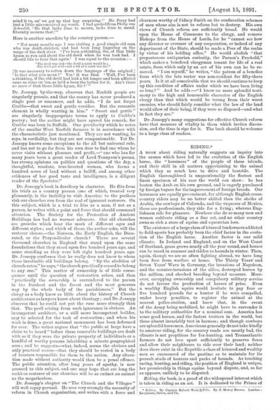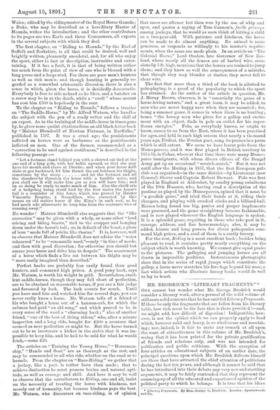RIDING.*
A BOOK about riding naturally suggests an inquiry into the causes which have led to the evolution of the English horse, the " horsiness " of the people of these islands, and their skill in all matters appertaining to the anima/ which they so much love to drive and bestride. The English thoroughbred is unquestionably the fleetest and finest specimen of his race the world can show : he has beaten the Arab on his own ground, and is eagerly purchased by foreign buyers for the improvement of foreign breeds. Our horsemen are equally pre-eminent, for although English cross- country riders may be no better skilled than the sheiks of Arabia, the cowboys of Colorado, and the vaqueros of Mexico, these are professionals, they ride for a living ; whereas Eng- lishmen ride for pleasure. Nowhere else do so many men and women cultivate riding as a fine art, and no other country owns so rich a store of equine and equestrian lore.
The existence of a large class of leisured landowners addicted to field-sports has probably been the chief factor in the evolu- tion of the English horse. Another factor is our mild climate. In Ireland and England, and on the West Coast of Scotland, grass grows nearly all the year round, and horses can be raced in summer and ridden to hounds in winter. Then, again, though we are so often fighting abroad, we have long been free from warfare at home. The Thirty Years' and Seven Years' Wars in Germany, the invasions of Napoleon, and the counter-invasions of the allies, destroyed horses by the million, and checked breeding beyond measure. More- over, occupying ownership and compulsory military service do not favour the production of horses of price. Even a wealthy English squire would hesitate to pay four or five hundred pounds for a hunter if he were compelled, under heavy penalties, to register the animal at the nearest police-sta.tion, and knew that, in the event of the Army being mobilised, he might have to surrender it, to the military authorities for a nominal sum. America has some good horses, and the fastest trotters in the world, but these almost invariably trot in harness; and though cowboys are splendid horsemen, Americans generally do not take kindly to amateur riding, for the country roads are mostly bad, the climate is not propitious for fox-hunting, and Transatlantic farmers do not love sport sufficiently to preserve foxes and allow their neighbours to ride over their land; neither does there exist in the Republic a class of leisured and wealthy men so enamoured of the pastime as to maintain for its pursuit studs of hunters and packs of hounds. As touching racing, hunting, and riding, the position of England is unique, her premiership in things equine beyond dispute, and, so far as appears, unlikely to be disputed.
Riding, the book, is a proof of the widespread interest which is taken in riding as an art. It is dedicated to the Prince of • Riding. By Captain Robert Weir.MPols. By J. Moray Brown. London : Longnians, Green, and Co.
Wales ; edited by the ridingmaster of the Royal Horse Guards ; a Duke, who may be described as a hereditary Master of Hounds, writes the introduction ; and the other contributors to its pages are two Earls and three Commoners, all experts in the several subjects with which they deal.
The first chapter, on "Riding to Hounds," by the Earl of Suffolk and Berkshire, is all that could be desired, well and brightly written, pleasantly anecdotal, and, for all who enjoy the sport, either in fact or description, instructive and enter- taining. If it has a fault, it is that of being written rather too much from the point of view of one who is blessed with a long purse and a large stud. For there are poor men's hunters as well as rich men's ; and though hunting is generally re- garded as a somewhat aristocratic diversion, there is also a sense in which, given the horse, it is decidedly democratic.
Everybody is free to ride as hard as he likes, and a butcher on a screw may be in at the death, while a " swell " whose mount has cost him £500 is hopelessly in the rear.
To the chapter on "Riding to Hounds," follows a treatise on "The Saddle-Horse," by Mr. Alfred Watson, who handles the subject with the pen of a ready writer and the skill of an expert. As to the training of the saddle-horse in times gone by, he gives some quaint citations from an old black-letter book by " Maister Blundevill of Newton Flatman, in Norffolke," published in 1597. It was a cruel age; the punishments inflicted on horses were as barbarous as the punishments
inflicted on men. One of the former, recommended as a 4' correction to be used against restifeness," is described in the following passage :— "Let a footman stand behind you with a shrewd cat tied at the one end of a long pole, with her belie upward, so that she may have hir mouth and claws at libertie ; and when your horse doth stale or goe backward, let him thrust the cat between his thighs, sometimes by the rump and let the footman and all the standers-by threaten the horse with a terrible noise, and you shall see it will make him goe as you will have him ; and on so doing be ready to make much of him. Also the shrill crie of a hedgehog being strait tied by the foot under the horse's tail is a reminder of like force, which was proved by Muster Vincentio Respino, a Neapolitan, who corrected by this means an old restive horse of the King's in such sort, as he had much ado afterwards to keep him from the contrarie vice of running away."
No wonder ! Maister Blundevill also suggests that the "like .corrective" may be given with a whelp, or some other "loud crieing and biting beasts," tied to the crupper and hanging down under the horse's tail ; or, in default of the beast, a piece
a iron "made full of pricks like thorns." It is, however, well to observe that Mister Blundevill does not advise the " waies
rehearsed" to be " commonlie used,"—only "in time of neede, and then with good discretion ; for otherwise you should but amaze your horse and drive him to despair." The amazement
of a horse which finds a live cat between his thighs may be 4 more easily imagined than described."
Perfect hacks are probably less easily found than good hunters, and command high prices. A good pony hack, says Mr. Watson, is worth his weight in gold. Nevertheless, excel- lent saddle-horses, though they may fall short of perfection, are to be obtained on reasonable terms, if you are a fair judge and favoured by luck. The luck counts for much. Until you have used him and watched him for several days, you can never really know a horse. Mr. Watson tells of a friend of his who bought a horse out of a hansom-cab, for which the cabman had paid "an old song," and which proved to be in every sense of the word a "charming hack ; " also of another friend, "one of the best of living riders," who, after a minute inspection and a long ride, bought for £200 a creature that seemed as near perfection as might be. But the horse turned out to be so inveterate a kicker in the stable that it was im- possible to keep him, and he bad to be sold for what he would fetch,—some £20.
The articles on "Training the Young Horse," "Horseman- ship," "Hands and Seat," are as thorough as the rest, and may be commended to all who ride, whether on the road or to hounds. From the chapter on " Race-Riding " we gather that a jockey, like a poet, is rather born than made ; that to achieve distinction he must possess brains and natural apti-
tude, as well as courage and skill. And here it may be well to observe that the contributors to Riding, one and all, insist on the necessity of treating the horse• with kindness, not merely out of humanity, but because kindness pays the best. Mr. Watson, who discourses on race-riding, is of opinion
that races are oftener lost than won by the use of whip and spur, and quotes a saying of Tom Cannon's, facile princeps among jockeys, that he would as soon think of hitting a child as a two-year-old. With patience and kindness, the horse can be made to do almost anything. No animal is more generous, or responds so willingly to his master's require- ments, when the same are made plain. In an article on "The Colonial Horse," Lord Onslow, late Governor of New Zea- land, where nearly all the fences are of barbed wire, occa- sionally 5 ft. high, mentions that the horses are trained to jump them ; and they know so well the consequences of a mistake, that though they may blunder at timber, they never fail to clear wire.
The fact that more than a third of the book is allotted to polo-playing, is a proof of the popularity to which the sport has attained. As the author of the article in question, Mr. J. Moray Brown, observes, it is "essentially the game of a horse-loving nature," and a great boon, it may be added, to men who are never happy save when they are mounted ; for, being a summer game, it comes in when there is no hunting ; hence "the horsey man who pines for a gallop and excite- ment with an object, finds in polo an outlet for his super- fluous energies." Polo, as everybody knows, or ought to know, comes to us from the East, where it has been practised for ages, and held in such high esteem that nearly a thousand years ago, Firdusi, the Persian poet, sang its praises in a poem which is still extant. We seem to have learnt polo from the Muneeporees ; and it was first played in British territory in 1854-55, in Cahar, where at that time there were many Munee- poree immigrants, with whom divers officers of the Bengal Army got up an occasional "scratch-match." But it was not until after the Mutiny, in 1857, that the first European polo club was organised—in the same district—by Lieutenant (now General) Sherer and Captain Robert Stewart. Polo was first played in England at Aldershot, by sundry young subalterns of the 10th Hussars, who, having read a description of the pastime as played by the Muneeporees, opined that it must be "a goodish game," and tried their hands at it, riding their chargers, and playing with crooked sticks and a billiard-ball. Horses being found too big, ponies and proper implements were procured, and the game straightway became fashionable, and is now played wherever the English language is spoken. It is a splendid game, requiring in those who take part in it, courage, address, and fine horsemanship ; also, it may be added, leisure and long purses, for clever polo-ponies com- mand high prices, and a stud of them is a costly luxury.
For the rest, Riding is a most excellent book ; besides being pleasant to read, it contains pretty nearly everything on the subject which is worth knowing. We cannot give equal praise to the pictures. The galloping and jumping horses are all drawn in impossible positions. Instantaneous photographs show that in the series of rapid jumps which constitute the gallop, a horse never stretches his fore-legs beyond his nose, a fact which artists who illustrate horsey books would do well to lay to heart.



































 Previous page
Previous page